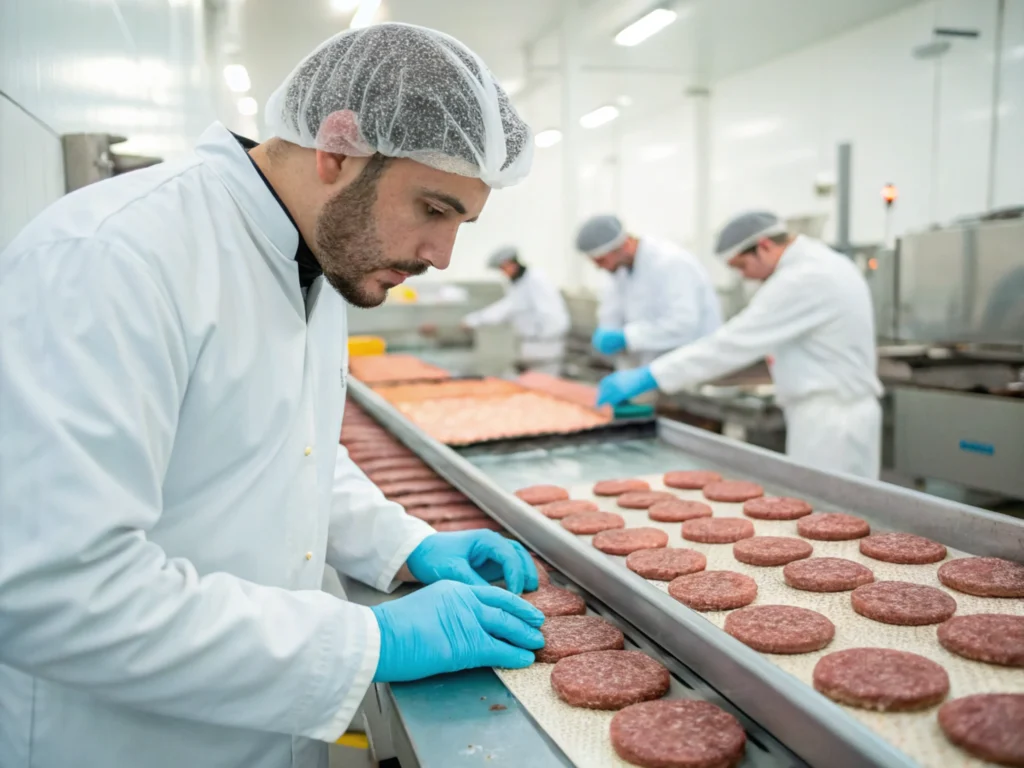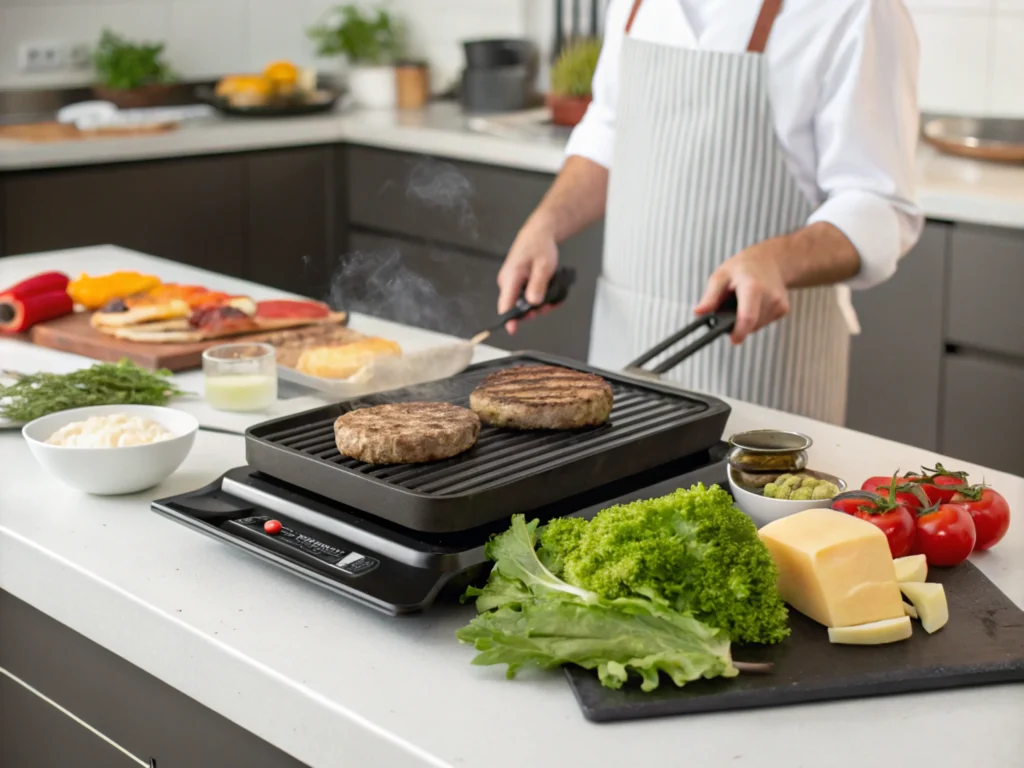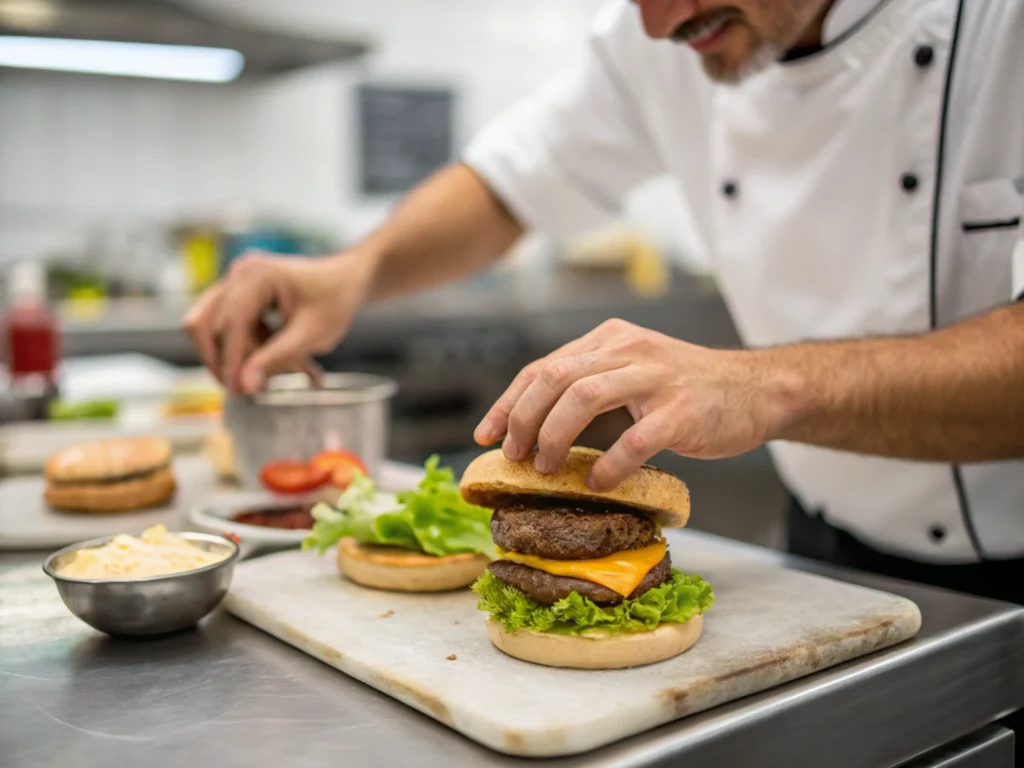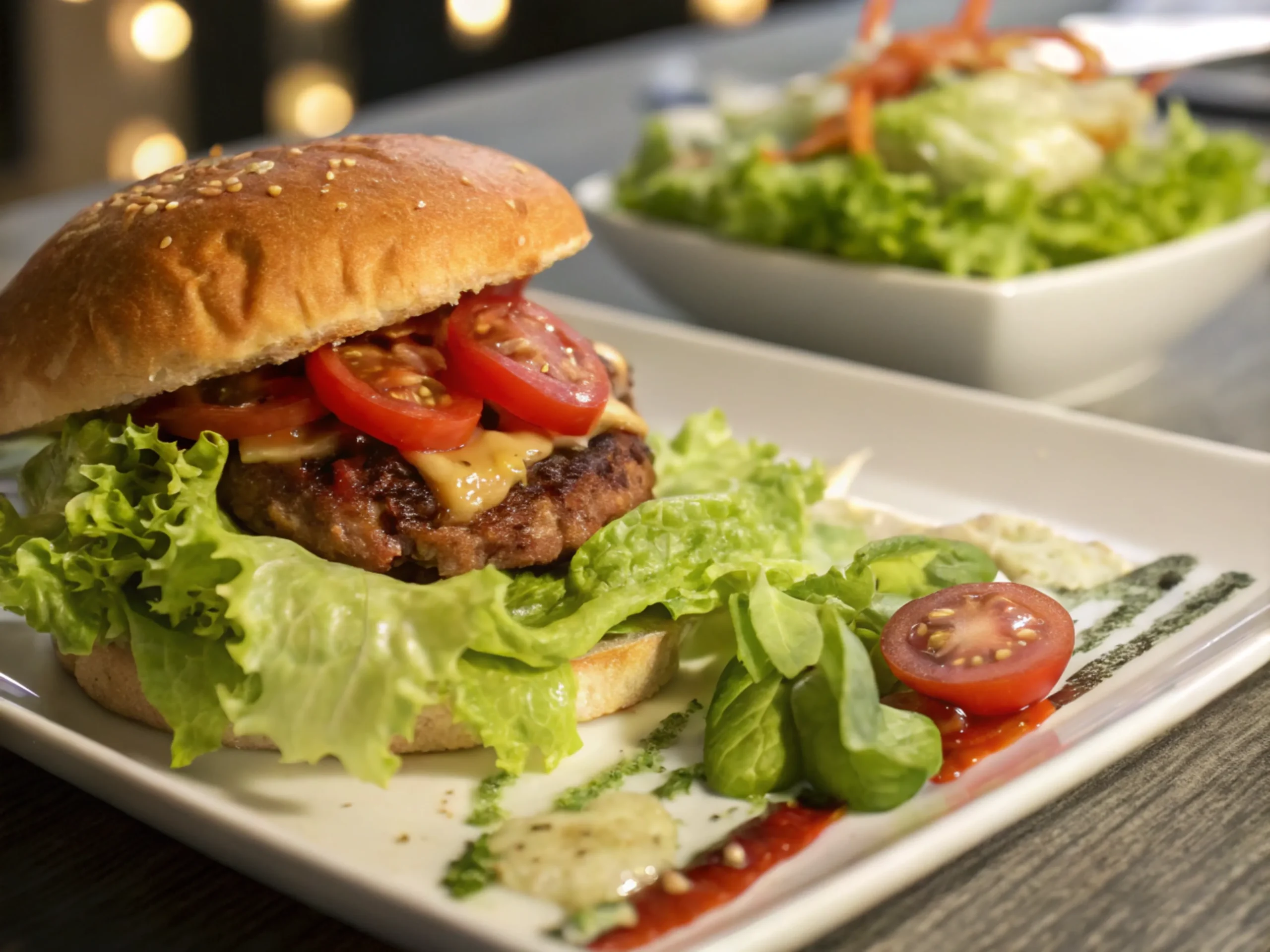Millions of people worldwide want to know if their favorite meals match their dietary beliefs. Dominos is a popular fast-food chain, but many ask, “Is Dominos burger halal?” This article explores what halal means, Dominos’ policies, and the options available for those looking for halal-friendly choices.
Table of contents
What Makes Food Halal?
Halal is an Arabic word that means “permissible.” It refers to foods that follow Islamic dietary laws. These laws forbid items like pork, alcohol, and animals not slaughtered properly. Halal certification ensures that food and its preparation meet these rules. For fast-food chains like Domino’s, following halal principles can help them appeal to a wider range of customers.
Essential Criteria for Halal Certification
To better understand if Domino’s burgers qualify as halal, it’s crucial to grasp the foundational requirements:
- Source of Meat: The animal must be slaughtered following Islamic practices, including specific prayers and humane methods.
- Ingredient Composition: The absence of haram (forbidden) ingredients, such as gelatin, alcohol, or non-halal animal by-products, is mandatory.
- Preparation Standards: Cross-contamination with non-halal items, such as pork or utensils used for haram foods, must be strictly avoided.
For customers, this means scrutinizing not only the main ingredients but also the sauces, sides, and even preparation methods to ensure complete compliance.
Understanding Domino’s Halal Policy
When addressing whether Dominos burger halal options are available, the answer varies significantly depending on the region. Dominos operates in over 90 countries, each with unique consumer needs and dietary regulations. While some locations have embraced halal certifications to cater to local demands, others rely on general ingredient transparency to address questions about whether Dominos burger halal standards are met.
Ingredient Transparency
Domino’s shares detailed ingredient lists for its products. While many toppings and ingredients are free from haram substances, some meats can raise concerns. For instance, the beef patties in Domino’s burgers may not always follow halal standards. This is because sourcing and slaughtering practices vary by location, making it important to check where the meat comes from.
In regions like the Middle East, Domino’s often uses halal-certified meat as a standard. However, in areas such as Europe or North America, Domino’s may not meet halal requirements due to differences in suppliers.
Learn more about the differences between halal and non-halal burgers to understand these variations better.

Regional Differences in Halal Offerings
Domino’s policies reflect the diversity of its global customer base. In Muslim-majority countries such as Malaysia, Saudi Arabia, and Indonesia, Domino’s menus often come with explicit halal certifications. These certifications are granted by trusted Islamic authorities, ensuring customers can dine with confidence.
In contrast, regions like the United States and Canada typically lack universal halal certification for Domino’s products. Although vegetarian options are widely available, meat-based dishes require further scrutiny. For example, while some Domino’s locations might use halal-certified beef patties, others may source meat from suppliers without halal credentials.
To navigate these variations, Domino’s customers should consult local menus or contact customer service to confirm the halal status of specific items.
Halal-Friendly Options at Domino’s
For customers following strict halal diets, Dominos burger halal options can vary depending on the region. To meet these needs, Dominos offers alternatives like vegetarian or plant-based dishes. These choices remove concerns about meat and cross-contamination, making it easier to enjoy a meal while following dietary rules.
Vegetarian Options
Domino’s has a wide range of vegetarian pizzas and sides that are ideal for halal-conscious customers. Popular choices include:
- Margherita pizza
- Cheese breadsticks
- Fresh salads
These vegetarian items are less likely to involve cross-contamination with meat-based products. However, it’s always a good idea to ask about preparation practices at your local Domino’s to be sure.
Customization for Halal Diets
Domino’s also allows customers to personalize their orders. You can create your own pizza using halal-friendly ingredients such as:
- Fresh vegetables
- Olives
- Halal-compliant sauces
Discover what makes a burger halal to explore how vegetarian options align with dietary requirements.
Key Ingredients in Domino’s Burgers
Understanding the composition of Domino’s burgers is essential for determining their halal status. Below is a breakdown of typical burger ingredients and their potential considerations for halal compliance:
| Ingredient | Amount | Halal Considerations |
|---|---|---|
| Beef Patty | 1 piece | May vary; check sourcing certifications |
| Cheese Slice | 1 slice | Often halal; verify rennet source |
| Lettuce | Handful | Halal |
| Sauce (e.g., mayo) | 1 tbsp | Verify for alcohol or animal-derived ingredients |
| Burger Bun | 1 piece | Halal; ensure no alcohol-based preservatives |
Hidden Concerns in Ingredients
Besides meat, some sauces and seasonings at Domino’s may have alcohol or animal-based additives. These hidden ingredients are easy to miss but are important for halal compliance. Customers should check the ingredient lists or ask staff for clarification to ensure their food meets halal standards.

The Role of Halal Certification
Halal certification from recognized authorities helps customers identify halal products. In countries with large Muslim populations, third-party groups often check and approve menus to ensure they meet halal standards. Domino’s locations in these regions proudly display halal certifications to reassure customers.
In countries where halal certification is less common, Domino’s focuses on ingredient transparency to address concerns. While helpful, this puts the responsibility on the customer to verify the details. Knowing how halal certification works—like proper sourcing, handling, and preparation—can help customers make informed choices.
Domino’s Halal Policy: A Closer Look at Ingredients and Certification
Continuing from the previous discussion, it’s important to explore Domino’s approach to transparency and the steps they take to address customer concerns about halal compliance. While some locations cater explicitly to halal-conscious consumers, others rely on generalized ingredient transparency.
The Complexity of Global Sourcing
Domino’s operates in more than 90 countries, each with unique regulations and cultural expectations. This global presence means that sourcing practices for ingredients such as beef, chicken, and sauces differ significantly:
- Muslim-majority countries: Locations in nations like Saudi Arabia and Malaysia typically work with halal-certified suppliers. These suppliers ensure that all meat products meet strict Islamic guidelines for slaughter and preparation.
- Non-Muslim-majority countries: In regions like the US or Canada, Domino’s often partners with local suppliers who may not follow halal standards. This variability necessitates scrutiny of regional menus and ingredient lists.
For instance, while the beef patties in certain countries may be certified halal, the same cannot be said universally. Customers should always verify this information by consulting the store or its official website.
Halal-Friendly Options at Domino’s
For customers adhering strictly to halal diets, Domino’s offers some workarounds to ensure compliance, even in regions without official halal certification.
Customizable Menus
Domino’s allows significant customization of its menu items, enabling customers to build meals that suit their dietary needs. By selecting halal-friendly ingredients and omitting questionable components, diners can create personalized dishes. Some popular options include:
- Vegetarian pizzas: Varieties such as the Margherita or Veggie Lover’s are naturally halal-friendly when precautions are taken to avoid cross-contamination.
- Create Your Own Pizza: Customers can opt for a plain base with halal-compliant toppings like vegetables, mushrooms, olives, and jalapeños.
Certified Locations as a Reference
For consumers in non-Muslim-majority countries, looking at the practices of halal-certified locations can provide guidance. For example:
- Malaysia: All Domino’s products, including burgers and pizzas, come with halal certification, ensuring compliance from sourcing to preparation.
- Middle Eastern Countries: Domino’s stores in the UAE and Saudi Arabia explicitly follow halal standards, offering a wide range of certified items.
Internal Link: Explore how Domino’s approaches halal certifications globally for deeper insights.
Navigating Cross-Contamination Risks
Despite the availability of halal-compliant ingredients, preparation practices can present challenges for those following a strict halal diet.
Understanding Cross-Contamination
Domino’s kitchens are typically shared spaces where meat, seafood, and vegetarian items are prepared side by side. Utensils, cooking trays, and even ovens are often used interchangeably, increasing the risk of cross-contamination. For instance:
- Meat-based toppings like pepperoni or sausage may inadvertently contact vegetarian or seafood items.
- Shared cutting boards or knives can transfer non-halal residues to otherwise halal-friendly products.
To mitigate these risks, customers can:
- Request separate utensils and trays: This step ensures that their order is handled in isolation.
- Speak with store staff: Asking about specific preparation practices can clarify whether cross-contamination is a concern.
Pro Tips for Halal-Conscious Diners
Understanding how to navigate Domino’s menu as a halal-conscious diner can make all the difference. Here are some tips to optimize your dining experience:
Stick to the Basics
Simplifying your order can help avoid potential issues. For example:
- Opt for plain pizzas with minimal toppings.
- Avoid items with ambiguous ingredients, such as specialty sauces or pre-marinated toppings.
Leverage Regional Knowledge
Customers traveling abroad can benefit from learning about Domino’s practices in specific regions. For instance, Muslim-majority countries often adhere strictly to halal guidelines, making it easier to enjoy a meal without added concerns.

Experiment with Vegetarian Pairings
Vegetarian items, such as garlic bread, salads, or plain pizzas, are typically safer choices for halal-conscious diners. Pairing these with customized toppings can create a satisfying and compliant meal.
Discover more about regional variations in Domino’s halal options to plan your next order effectively.
FAQs: Addressing Common Questions
Is Domino’s beef halal?
Domino’s beef is halal-certified in some regions, such as Malaysia and Saudi Arabia. However, in places like the US, beef products might not meet halal standards due to different sourcing and preparation practices.
Is Domino’s halal or not?
It depends on the region. In Muslim-majority countries, many Domino’s locations offer halal-certified products. In other areas, this is not guaranteed. Always check with your local store to confirm.
Which pizza is halal in the USA?
In the USA, Domino’s does not certify any menu items as halal. However, vegetarian options like Margherita or Veggie Lovers pizzas are usually safe choices for those following halal guidelines.
Is Domino’s cheese halal?
Most Domino’s cheese is made with microbial rennet, which is halal. But since the source can vary, it’s best to check with your local store for confirmation.
How can customers verify halal status?
You can confirm halal status by:
- Looking for visible halal certification at the store or on the menu.
- Checking ingredient lists for haram substances.
- Asking Domino’s staff or contacting customer service for details.
What steps can Domino’s take to expand halal offerings?
To better serve halal-conscious customers, Domino’s could:
- Work with halal-certified suppliers worldwide.
- Clearly label halal items on menus.
- Create separate preparation areas to prevent cross-contamination.

Conclusion
Dominos is a global brand that works to meet different dietary needs, including those of halal-conscious customers. However, sourcing and preparation practices can vary. This means customers must check if Dominos burger halal options are available. Some regions offer certified halal choices, but others may need extra care and verification. By learning about halal rules and local practices, customers can answer the question: Is Dominos burger halal?

